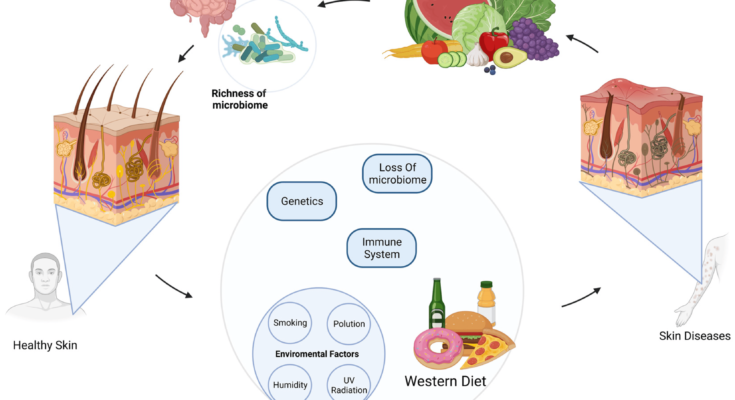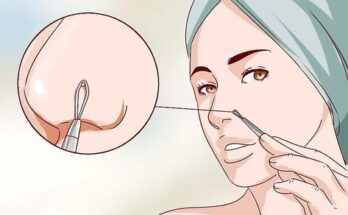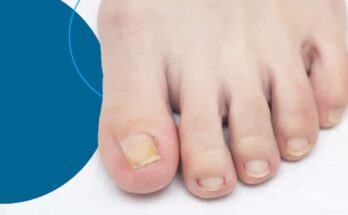Acne is a common skin condition that affects millions of people worldwide. Whether you are a teenager dealing with puberty-related breakouts or an adult struggling with persistent acne, this condition can have both physical and psychological impacts. While factors like genetics, hormones, and skincare routines are often discussed when it comes to acne management, diet plays a significant yet often overlooked role.
In recent years, research has increasingly suggested that what we eat may influence the development, severity, and response to acne treatment. This article explores the complex relationship between diet and acne, shedding light on how certain foods might aggravate or improve the condition. We will also discuss how dietary changes can enhance the effectiveness of conventional acne treatments.
1. Understanding Acne: Causes and Risk Factors
Acne is a skin condition that typically affects the face, shoulders, back, and chest. It occurs when hair follicles become clogged with oil, dead skin cells, and bacteria, leading to inflammation. Acne can manifest in different forms, including pimples, blackheads, whiteheads, cysts, and nodules.
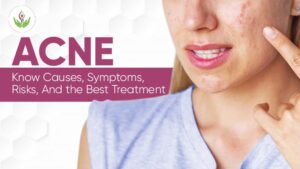
The primary factors that contribute to acne development include:
- Hormonal Changes: Androgens (male hormones) increase during puberty, menstruation, and other hormonal shifts, leading to an increase in oil production.
- Excess Sebum Production: Overactive sebaceous (oil) glands can clog pores.
- Clogged Pores: Dead skin cells can block hair follicles, causing acne.
- Bacterial Growth: Propionibacterium acnes (P. acnes) bacteria thrive in clogged pores, causing inflammation and breakouts.
- Inflammation: Chronic inflammation plays a role in the development of severe acne.
- Genetic Predisposition: Family history can influence susceptibility.
2. The Role of Diet in Acne
Dietary factors can affect acne in multiple ways, influencing hormonal fluctuations, insulin levels, inflammation, and sebum production. While diet is not the sole cause of acne, certain foods may exacerbate symptoms, while others may help prevent or reduce breakouts. Understanding the mechanisms behind these effects can provide valuable insights into how diet can play a role in acne management.
2.1. Insulin and Glycemic Index: The Sugar-Acne Connection
One of the key ways diet impacts acne is through its influence on insulin levels. Foods with a high glycemic index (GI), such as refined carbohydrates, sugary snacks, and fast food, cause a rapid spike in blood sugar. This, in turn, triggers the body to produce more insulin to help regulate blood sugar levels.
High insulin levels can:
- Increase androgen production: Elevated insulin levels lead to an increase in androgen hormones, which stimulates sebaceous glands and results in more oil production.
- Inflame the skin: High insulin can promote inflammation, contributing to acne lesions.
- Cause hyperkeratinization: This is the thickening of the skin, which can block pores and create an environment conducive to acne.
Refined carbs like white bread, pasta, and sugary treats have been linked to worsening acne symptoms. In contrast, foods with a low glycemic index, such as whole grains, legumes, and vegetables, are less likely to spike blood sugar levels and may help reduce the risk of breakouts.
2.2. Dairy Products and Acne
Dairy products have been another controversial topic in acne research. Several studies suggest that consuming milk, particularly skim milk, is associated with an increased risk of developing acne. The relationship between dairy and acne is not entirely understood, but several potential mechanisms have been proposed:
- Hormonal content: Milk contains hormones such as insulin-like growth factor 1 (IGF-1), which can stimulate the production of sebum and increase the risk of acne.
- Inflammatory response: Dairy products may trigger inflammation in some people, exacerbating acne.
Some individuals with acne may find that eliminating or reducing dairy intake improves their skin, although this may not be the case for everyone. Full-fat dairy, in particular, is thought to have less of an impact on acne than skim milk or low-fat varieties.
2.3. Omega-3 Fatty Acids: Anti-Inflammatory Benefits
Omega-3 fatty acids, found in foods like fatty fish (salmon, mackerel, sardines), walnuts, flaxseeds, and chia seeds, are known for their anti-inflammatory properties. Since inflammation plays a central role in acne development, incorporating omega-3s into your diet may help reduce acne severity.
Research suggests that omega-3 fatty acids may:
- Reduce sebum production: Omega-3s have been shown to help regulate oil production in the skin, preventing excessive sebum that can clog pores.
- Improve skin barrier function: These fatty acids help strengthen the skin’s protective barrier, making it more resistant to external irritants and bacteria.
- Reduce acne inflammation: Omega-3s can lower the levels of inflammatory cytokines, which can help reduce the redness and swelling associated with acne.
3. Foods That May Help Prevent Acne
While there is no one-size-fits-all approach to managing acne, certain foods can have a beneficial effect on skin health. Incorporating these foods into your diet may help reduce the frequency and severity of acne breakouts.
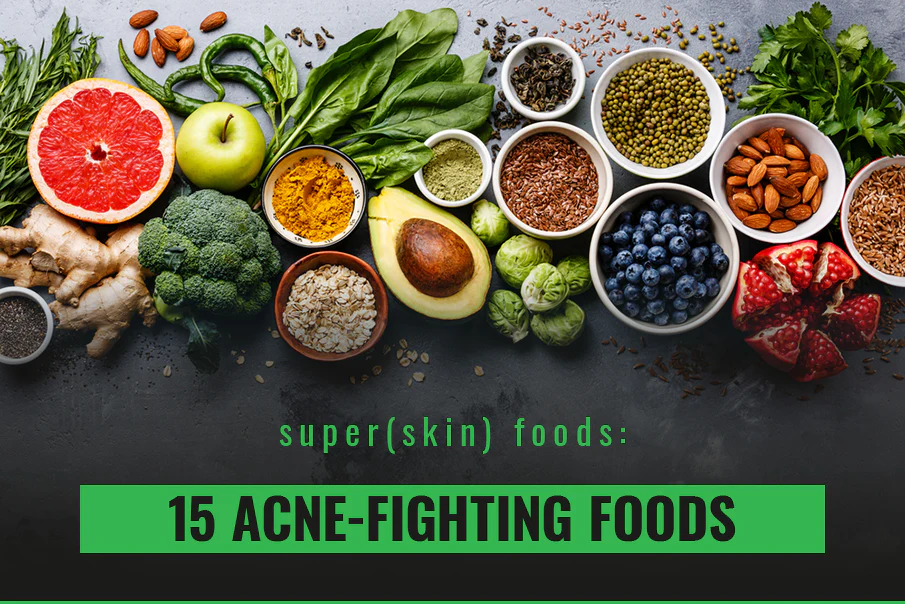
3.1. Antioxidant-Rich Foods
Antioxidants protect the skin from oxidative stress and inflammation. Foods rich in antioxidants can help prevent acne by reducing skin irritation and promoting healthy skin. Some examples include:
- Berries: Blueberries, strawberries, and raspberries are high in antioxidants that help reduce inflammation.
- Green leafy vegetables: Spinach, kale, and other dark greens contain vitamins A and C, both of which are important for skin health.
- Nuts and seeds: Almonds, sunflower seeds, and pumpkin seeds are packed with vitamin E, which helps protect the skin from damage.
3.2. Zinc-Rich Foods
Zinc is an essential mineral that plays a role in immune function, wound healing, and inflammation regulation. Studies have shown that individuals with acne often have lower levels of zinc. Including zinc-rich foods in your diet may help reduce the frequency of breakouts and improve skin healing. Good sources of zinc include:
- Shellfish: Oysters, crabs, and lobsters are excellent sources of zinc.
- Pumpkin seeds: These are a plant-based source of zinc and also contain other skin-boosting nutrients.
- Legumes: Lentils, chickpeas, and beans provide zinc along with fiber and protein.
3.3. Probiotics and Gut Health
There is increasing evidence that gut health plays a role in skin conditions like acne. Probiotics, which are beneficial bacteria that support gut health, may help balance the skin’s microbiome and reduce inflammation. Fermented foods such as yogurt, kefir, kimchi, sauerkraut, and kombucha are rich in probiotics and may benefit individuals with acne.
A healthy gut can improve immune function and reduce systemic inflammation, which in turn may have a positive effect on acne.
4. Foods That May Exacerbate Acne
Just as some foods can help improve acne, others may contribute to breakouts. Identifying and eliminating certain foods from your diet may be an effective strategy in managing acne. While each individual’s response to food is unique, the following categories are commonly associated with worsening acne.
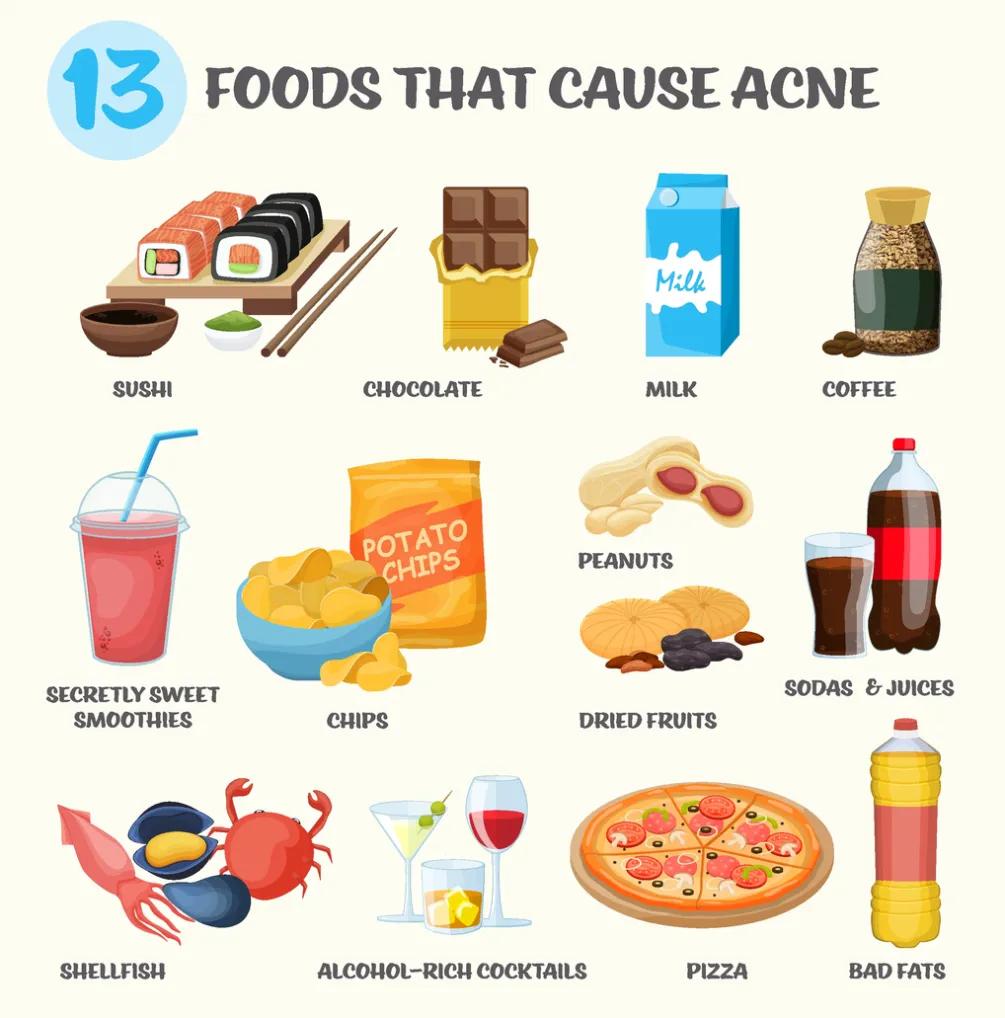
4.1. High-Glycemic Foods
As mentioned earlier, high-glycemic foods, such as sugary snacks, sodas, white bread, and pasta, can cause insulin spikes that lead to increased oil production and inflammation. Limiting these foods can help manage acne flare-ups.
4.2. Dairy
For some individuals, dairy products—especially low-fat or skim milk—may aggravate acne. If you suspect dairy is contributing to your breakouts, try eliminating it from your diet for a few weeks to see if your skin improves.
4.3. Processed Foods
Highly processed foods, including fast food, packaged snacks, and sugary baked goods, often contain unhealthy fats, added sugars, and artificial additives that can trigger inflammation in the body. Opting for whole, minimally processed foods can help reduce the likelihood of acne.
5. How Diet Interacts with Acne Treatments
Diet can also influence the effectiveness of acne treatments. While conventional acne medications, such as topical retinoids, benzoyl peroxide, and antibiotics, remain the cornerstone of acne management, dietary changes can complement and enhance their effects.
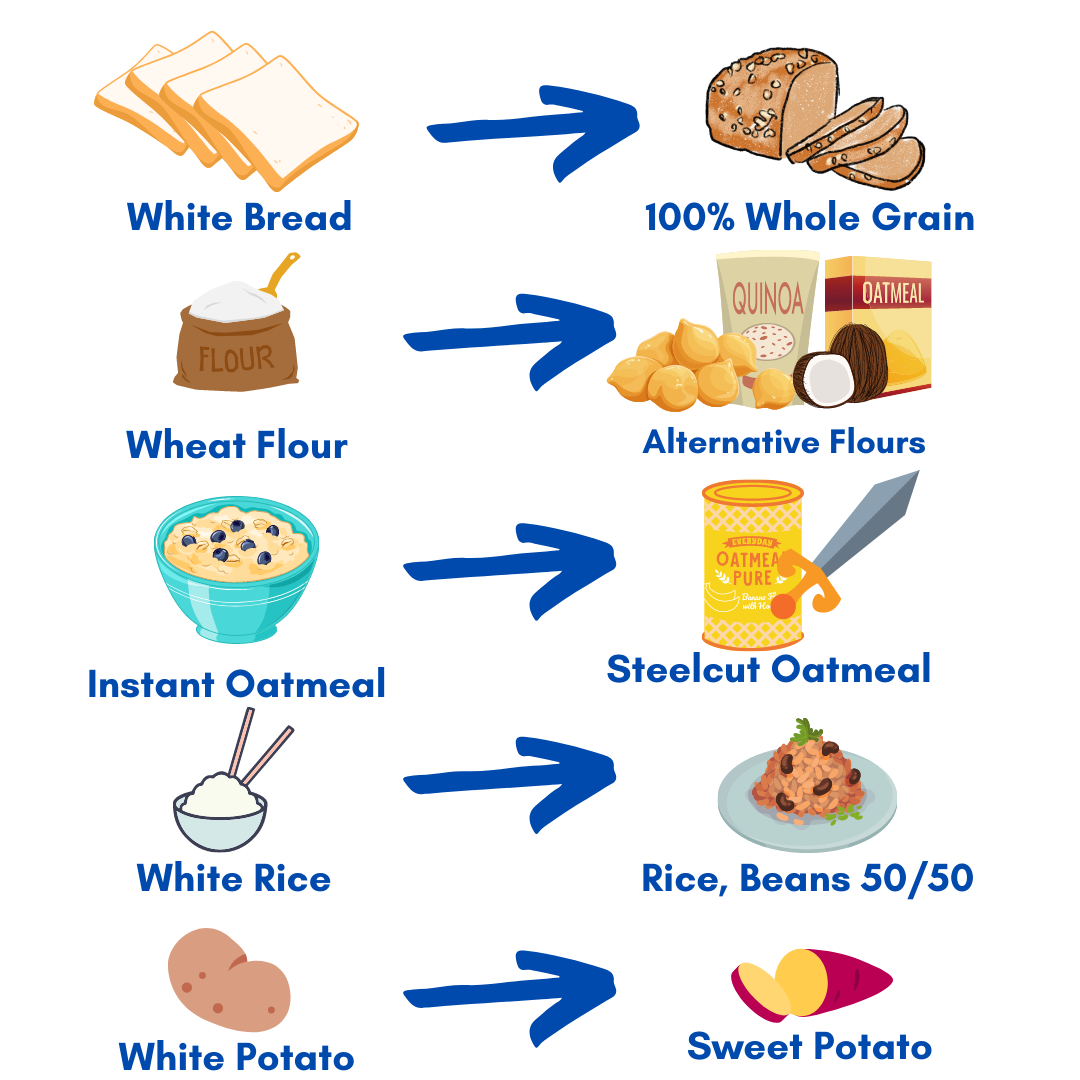
5.1. Diet and Topical Treatments
Certain foods can enhance the skin’s ability to repair itself, potentially improving the effectiveness of topical treatments. For example, foods rich in vitamin A (such as sweet potatoes, carrots, and leafy greens) can support the skin’s natural regeneration process, complementing the effects of retinoids, which are derivatives of vitamin A.
5.2. Diet and Oral Medications
Some acne treatments, such as oral antibiotics and hormonal therapies, work by reducing inflammation and controlling oil production. A diet that supports overall inflammation reduction, such as a high intake of omega-3s and antioxidant-rich foods, can support the action of these medications.
5.3. Dietary Modifications During Accutane Treatment
Accutane (isotretinoin) is a powerful medication used to treat severe acne. While on Accutane, it’s crucial to avoid certain foods that can exacerbate side effects, such as alcohol and vitamin A supplements, which can increase the risk of toxicity. A diet rich in hydrating foods, such as cucumbers, watermelon, and berries, can help manage the dryness and irritation that often accompany Accutane treatment.
